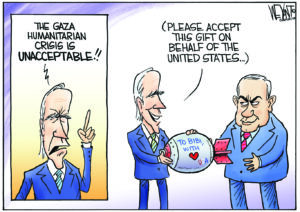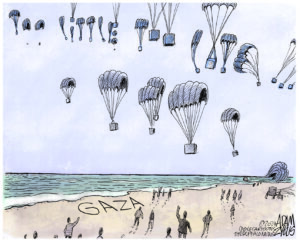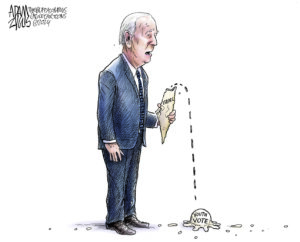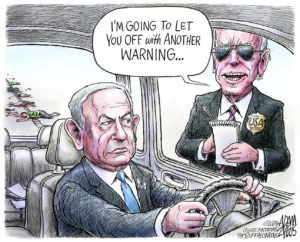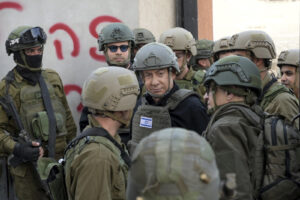The Indiscriminate Compassion of Haneen Zoabi
In a government driven mad and violent by self-interest and fear, the Israeli legislator is battling enemies many of her peers appear not to see.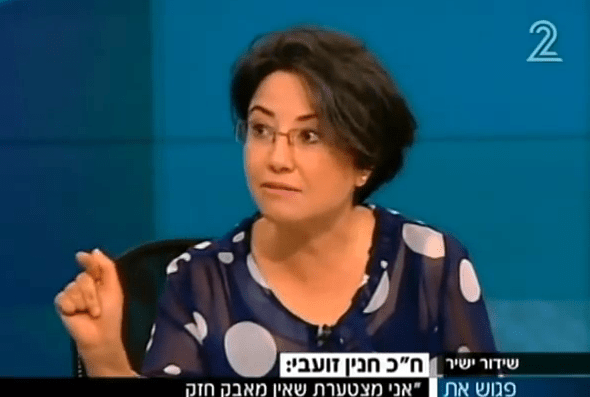
This piece was prompted by Truthdig contributor Scott Tucker. Read his remarks on Zoabi’s significance here.
The overall context of Israeli action is that of occupation and terrorism. The overall context of Palestinian action is a legitimate struggle against occupation.
— Israeli Knesset member Haneen Zoabi
If you were held down by a pack of people and beaten mercilessly, would you think it fair if during and afterward, onlookers and those involved described what happened as a fight? Would you think you were justified in doing anything you could to protect yourself? Could the same characterization of aggression be applied to their assault and your fraught effort at self-defense? These are questions supporters of Palestinians, including Haneen Zoabi, the first female Arab Israeli to represent an Arab party in Israel’s legislature, desperately want international observers to consider as residents of the Gaza Strip move into a second week of deadly coordinated assaults. Israel’s Netanyahu government is raining upwards of hundreds of missiles a day upon the region of 1.8 million people, which is twice the size of Washington, D.C.. The targets are schools, mosques, houses and charities it says are bases of military operation.
The air campaign by the Israel Defense Forces, which had killed 159 Palestinians as of Saturday night — the majority of them civilians, medical sources say — comes after the abduction and slaying of three Israeli teenagers by unconfirmed attackers in the West Bank, a part of Palestinian territory into which Israeli settlers have encroached under the aegis of official policy for over four decades. The strikes also follow a steady barrage of rockets fired by Palestinian militants led by the Islamic group Hamas, which has controlled the Gaza Strip since 2007, into Israel’s populated areas, including the cities of Jerusalem and Tel Aviv. Amnesty International recognized Israel’s decision to attack the population in general rather than the combatants among it as “collective punishment,” saying, “Justice will not be served by Israel seeking revenge by … committing other violations of Palestinians’ rights.”
No Israelis have been reported killed by rocket fire since the beginning of July, though a number have been confirmed as injured. But Israeli leaders intend to inflict maximum punishment. Defense Minister Moshe Ya’alon said in the offensive’s early days, “The operation against Hamas has not ended. It will continue. We will continue to act against Hamas, to strike its people. At every opportunity and every place, the organization will pay a heavy price for its actions.”
The standard response to the questions raised above from those whose sympathy extends only to Israel’s Netanyahu government was clearly put by White House press secretary Josh Earnest last week: “We strongly condemn the continuing rocket fire into Israel and the deliberate targeting of civilians by terrorist organizations in Gaza,” he told reporters. “No country can accept rocket fire aimed at civilians, and we support Israel’s right to defend itself against these vicious attacks.” This is an adequate summary of the conflict between the leaders of both areas only if it is ignored that the Israeli government, a well-organized, politically and militarily dominant, and internationally backed and funded organization, has been far more effective in recent decades at killing Palestinian civilians than the militant wing of its opponent’s divided leadership has been at killing Israelis — at a reported ratio of more than 5 to 1. Substitute “Palestine” for “Israel” and Earnest’s assessment would be significantly more credible.
This is not to say, Zoabi insists, that violence from Palestinians is desirable or pardonable. That is precisely what she has been accused of saying, however, by some in Israel’s media. In a late June interview with Israeli television’s “Meet the Press,” host Rina Matzliach asked Zoabi about her view, expressed in an earlier interview, that the kidnappers of the three Israeli teenagers mentioned above were not “terrorists.” Zoabi responded (in Hebrew, with her statements translated) that she was sorry that “there is not a strong enough struggle opposing the [Israeli] occupation.” She then attempted to explain, through repeated interruptions and attempts at diversion from her host over a period of 20 minutes, that Palestinian behavior toward Israelis, including violence, has to be understood as a desperate response to Israeli dominance and aggression rather than a string of thoughtful, deliberate acts committed without influence. Absent the refusal to end settlements, release prisoners and generally end the long, ongoing provocation, she insists, Palestinians would have no reason to resort to violence. Their actions therefore must be understood sympathetically as panicked bids for self-defense in a deeply unfair fight, however misguided and reckless they may be.
“Does it seem strange to you that people under occupation kidnap?” echoed the recording of her earlier interview. Emphasizing that she did not condone the kidnapping and wanted the victims returned immediately and without injury, the kidnappers, she told Matzliach, “are not terrorists because I look at the macro level.” As to the strategy she endorses on the part of Palestinians and their sympathizers, Zoabi spoke of “a just struggle within the limits of international laws [and ‘human morality’] against the occupation.”Matzliach was not impressed with Zoabi’s view. Instead she worked to discredit Zoabi as a supporter of terrorism who is ungrateful for the right to free expression the state grants her, a dissident who seeks to provoke her colleagues for the fun of it and incite anti-Israeli hatred. The most interesting of Matzliach’s comments came first when she accused Zoabi of lacking empathy for the mothers of the Israeli boys who were abducted and at that time not known to be dead, and then in her final statement, when she said Zoabi’s way of speaking, which she described as lacking “emotion,” was inherently “inciting.” This rendering of Zaobi’s “sins” in the language of feeling is interesting because it reveals the lens through which many, if not most, of her opponents view her, and illuminates the crucial difference between her and them. They feel pain at having their neighbors taken away from them. Nothing matters beyond this offense. Zoabi suffers too, but her pain extends to others who do not speak her language, follow her religion (if she has one) or hail from her country.
Her compassion seems to be universal. “To me, they are both equal,” she said of young Israelis and Palestinians recently reported killed in fighting. But moreover, her experience of pain and horror are joined by the products of her intellect, which she uses to attempt to understand the totality of the predicament bearing down upon everyone around her. She allows intelligence to modify feeling. This exercise is strange and horrifying to people who, for any number of reasons, do not, and perhaps to a significant degree, owing to long-ingrained habits of mind, cannot do it. The sin of “unfeeling” is precisely the charge leveled against the hero in the mid-20th century French novelist Albert Camus’ “The Stranger” by a community of people who live together in their excitements, sorrows and frustrations, and who, because of their distrust of dispassionate criticism — the enlightened products of which represent their only chance at salvation — are doomed to go on enduring them.
“I acknowledge that we must hold a struggle with humane measures and you don’t want to acknowledge the suffering of the Palestinians,” she concluded in her encounter with Matzliach. “My way, my vision to end the occupation, is the only way to not repeat terrorism.”
Haneen Zoabi is caught in a society seized by fear of a loss of self-determination to Others, a feeling that justifies any killing or theft. The fear is useful to elites looking to preserve their power and maintain the sense of self-determination they possess as a group and as individuals apart from their fellow citizens, who may turn against them if they are not kept too excited to think carefully and fully. At increasing risk to herself, as evidenced by the effort by her colleagues to ban her from running again for the legislature (the “racism and… oppression” of which she is seen combating zealously in footage across the Internet), the stripping of the right to take part in parliamentary discussions and committee votes, and the bodyguards that follow her everywhere as a result of the death threats she received for participating in the 2010 Gaza flotilla, Zoabi is working with what appears to be a full heart and a clear mind against enemies her peers either do not see or acknowledge.
Your support matters…Independent journalism is under threat and overshadowed by heavily funded mainstream media.
You can help level the playing field. Become a member.
Your tax-deductible contribution keeps us digging beneath the headlines to give you thought-provoking, investigative reporting and analysis that unearths what's really happening- without compromise.
Give today to support our courageous, independent journalists.

